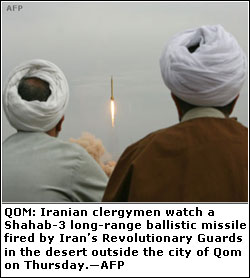The Importance of Being Non-Myopic

Today, we swim in a deep ocean of information: and yet the ability to critically sift through them is increasingly becoming obsolete. What happened to the critical thinking skills that my college professors nailed into my skull at the expense of my sheer physical and mental pain? I think the capability to think methodically and process information globally and in parallel with other events in the world allows us to foresee, to calculate and to forecast the enemy’s next move and it must be mandatory for all of our representatives in the government. The Islamic Republic has mastered this ability quite cleverly although in a self-destructive and diabolical way. Ahmadinejad’s pre-emptive call for talks with Syria and Iraq to upstage the United States is the latest example of this ability.
The global threat initiated by the Islamic Republic over 27 years ago is escalating at an alarming rate.(see my previous post Strategic Suicide) Note, the threat posed by the Medieval Republic doesn’t involve any nuclear weapons at the hands of mullahs so far.
Yet, the White House, or I should say the liberal-ridden MSM has devoted itself to a dangerously myopic and predictably doomed diplomatic process designed only to address one aspect of the threat, which is the Medieval Republic’s nuclear program. Indeed, the current U.S. offer to Iran for an incentive package in exchange for the suspension of uranium enrichment contains no mention that Teheran has to get out of the terrorism business. This is in contrast to the 2002 negotiation between Washington and Libya.Instead, the only thing that concerns the the administration is Iran's nuclear program. The administration's assumption is that a terrorist Iran would honor any agreement — nuclear or other otherwise.
And as if this was not bad enough, those who have been conducting this diplomacy for over 3 years have no interest-- nor we should expect them-- to confront their client state, Iran, why would they?
In 2005 Germany had the largest share of Iran's export market with $5.67 billion (14.4%) after Italy. (see here , here and here). In fact, overall, exports by EU countries rose from E5.3 billion in 2000 to E11.8 billion in 2004, making the EU Iran's largest trading partner and accounting for 35 percent of Iran's total imports, according to the European Commission. Then, is it any wonder that the 3-year long EU negotiations have not yielded anything but only mangaged to buy time for the Medieval Republic to reach its goal of building their Shia/Mahdi bomb?
Moreover, both Russia and China have extensive economics, political, and military ties to Iran. Russia is building the nuclear power plants for them and China has major oil deals with them at discount prices. Some friends in Iran consider Iran as a cash cow for the Russian. They inform me that Iran contracts and pays Russia astronomical amounts of money for projects that tend to never finish and are eventually abandoned. Following this to its logical conclusion , is anyone surprised that these two countries have continuously and forcefully obstructed any meaningful diplomacy or economic efforts to prevent Iran from acquiring nuclear weapons?
Instead of relying on diplomacy, delusional and glorious talks alone, the United States should broaden its strategy and view things globally. A broad and long-term strategy that will prevent Iran from going nuclear, contain and suppress it’s hegemonic ambitions and encourage and facilitate a fundamental political transformation within its borders. No other country in the Middle East is more ripe for democracy than Iran. The next question is how do we achieve these objectives?
 ABF, for the promotion of human rights and democracy in Iran
ABF, for the promotion of human rights and democracy in Iran



3 comments:
I think it is worthwhile to revisit these two documents. Some of the points outlined support and reinforce what you mention in this post.
However, neither document mentions anything about lending support to various ethnic groups working against the regime, nor do they refer to and highlight the opposition leadership issue/problem as well as forming a “unified” opposition government in exile.
I believe that the first step before embarking on a democracy mission is regime change. That regime change must be done by force, using multiple leverage points. (I am not pointing to military option alone).
Democracy is a process not a product. The ground must be well prepared before regime change and the introduction of a democratic process.
There is, also, a vast difference between a strategy and its implementation. I think Iraq is a good example in this case. The basic strategy for Iraq was correct, but wasn't implemented properly, imo.
Finally, I’m of the opinion that we must remain in focus and on target. IRI and her supporters' tactics and diversions must not distract us. I fully agree that critical thinking is vital in this situation.
United States Policy Toward Iran
R. Nicholas Burns, Under Secretary for Political Affairs
Opening Statement before the House International Relations Committee
Washington, DC
March 8, 2006
http://www.state.gov/p/us/rm/2006/62779.htm
America’s Iran crucible: Beyond Yapping Dogs and Superpowers Made out of Straw
By Alex Alexiev
http://www.centerforsecuritypolicy.org/Americas_Iran_crucible.pdf
Unsure why the two document links in previous post didn't work. I re-post them and they seem OK in preview.
United States Policy Toward Iran and Americas Iran crucible - Beyond Yapping Dogs and Superpowers Made of Straw.
Hey good post- the problem as you admit is what we do next I'll be interested in your ideas.
By the way waht do you think of Gemayel's assassination in Lebanon- I wonder whether its an Iranian or Iranian rogue part of the Syrian state which is involved.
Post a Comment